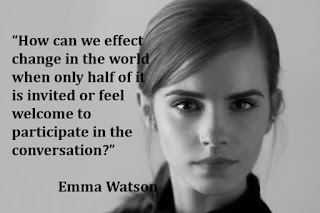Suffocating Rage
Similar to Audre Lorde’s previous article about “The Master’s Tools”,
her article, “The Uses of Anger”, is very similar in which they both propose
using what would be considered weaknesses as strengths. While before Lorde
argued that people, especially women need to acknowledge and accept their
differences, she is again reasoning that women have to acknowledge one’s one
rage and the rage of others. Something that surprised me and that I had never
thought of before was Lorde’s argument that a lot can be learned from rage and
anger. There is an unexpected honesty behind one’s anger. Lorde also explores
the darkness behind the act of suppressing rage. She argues that to suppress one’s
rage is to conform: “Their repression of rage (if and when they feel it) and
their silencing of the rage of other black people are the sacrificial offering
they make to gain the ear of white listeners”. This quote really stood out to
me because I had never thought of rage as something that should be openly
expressed before, but now I see that to denying oneself the emotion is to
conform and to create even more barriers with others. Similar to this idea of
conformity, Bell Hooks describes in her article, “Killing Rage: Militant
Resistance”, that some “black folks” will conform and monitor their language so
that they will be more accepted. Hooks then claims, “This acceptance is a form
of complicity.” This quote made me recognize my own white privilege and that I’m
fortunate that I don’t have to conform and alter what is say based on my skin
color. I thought it was really interesting when Hooks describes her own
personal experience and events of the day her friend gets kicked out of her
first-class seat by rude flight attendants. Hook then goes on to explain the
miscommunication with the wrong airplane tickets and is met with unrelenting
hostility when asked to speak with the manager. By speaking up when given the
wrong airline ticket, Hooks is being an active participant in society and is
fighting for a change.
When Lorde discusses guilt and anger, I am reminded of Frye’s
birdcage analogy, with guilt and anger acting as the wires keeping one
imprisoned inside the cage. Lorde beautifully explains this concept by stating,
“Your fear of that anger will teach you nothing…guilt and defensiveness are
bricks in a wall against which we will all perish”. Another important point
Lorde brings up is the meaning and difference of hatred vs. anger. Before I had
viewed them as pretty much synonymous, but after reading this, I have learned
that “hatred is the fury of people who don’t share their goals and anger is the
grief of distortion between peers” (Lorde). Lorde then describes these
distortions as the barriers between people which again goes back to the ideas
expressed about differences in her other article “The Master’s Tools”. These
differences are what lead to brutality and violence in riots. I
think a really important argument Ijeoma Oluo makes in her article, “Riots Are
Not Counterproductive”, is that it is not a matter of if rioters get punished
or not. Often times, I feel that people get too caught up in making sure “dues
are paid” so to speak and not that people get treated equally. People are too
considered with getting “justice” which most often is in the form of violence
and brutality. Oluo argues that “rioters should be arrested—they should not be shot.
Looters should be arrested—they should not be beaten”.
- Jane B
- Jane B



Comments
Post a Comment